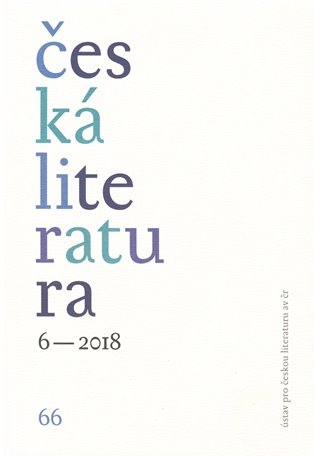Koncept humanismu v marxisticky formované
paleobohemistice (1956–1996)
The concept of humanism in Marxist-based paleo-Czech studies (1956–1996)
Author(s): Petr VoitSubject(s): Czech Literature
Published by: AV ČR - Akademie věd České republiky - Ústav pro českou literaturu
Keywords: Czech literature; Latin literature; Humanism; Humanist Czech; national humanism; Renaissance; Reformation; Unity of Brethren; progressiveness; people; popular reading books; entertaining prose; patrio
Summary/Abstract: This article presents a retrospective view of the activities of six scholars (Josef Hrabák, Jaroslav Kolár, Milan Kopecký, Eduard Petrů, Emil Pražák and Zdeňka Tichá), who between 1956 and 1996 took an interest in the Renaissance and Humanism in the Czech lands. It might appear that the Marxist ideology of the time must inevitably have distorted the researchers’ professionalism to varying degrees, but this article convincingly proves that this was not entirely unavoidable at least for an interpretation of the period between Hussitism and the Battle of the White Mountain, as in 1956, thanks to Hrabák’s “programme”, this research orientation acquired a strong focus on Josef Dobrovský, and thus on a patriotic assessment of the meaning of Czech history, as had been required by the First Republic. Because postwar Communist doctine paradoxically intersected the same milestones as Masaryk’s nation-building programme, based on the ethos of Hus, Palacký and Havlíček, none of the six scholars under review needed to resort to the political vocabulary that was characteristic of the latter half of the 20th century. Marxist ideology required the emphasis to be at best on progressive trends and the people, the latter term being understood ad hoc to mean both the townspeople and the rural population. On the other hand, the religious question was brought down to just the anti-Habsburg and anti-Rome sentiments of the Unity of Brethren, so that politically deferential research into the 16th century must have missed the most valuable aspects, i.e. the reconceptualization of the inherited canon, whereby the patriotic (i.e. the sole correct) interpretation of literary development was enhanced by dual Catholic-Utraquist and all non-conformist literature. The actual term humanism was overused as need required but without a strict definition, implying identification with humanity in the modern sense of the word. Curiously, this interpretational vagueness then allowed the term humanism to be confused with the Renaissance (and vice versa), thus covering the entire period between Hussitism and the White Mountain within these categories. This sleight of hand was based on a Marxist interpretation of Hussitism, which beyond the obvious positive aspects did not allow for an examination of the negative effects of this revolutionary movement on the subsequent development of bourgeois society (in particular). Hence what was known as the first, Hussite Reformation was declared to be the primary basis for the Renaissance and Humanism in the Czech lands. From the 1980s Eduard Petrů devoted himself to an alternative conception of Humanism. Its alternative and seemingly apolitical nature stemmed from the fact that this conception was not associated with the politically topical interpretation of Hussitism, but then in contrast the Humanism of the Czech lands was enthusiastically found to include a seemingly special feature known as the information explosion. Basically, however, this was a final stage of Humanism for popular consumption (involving its diffusion and imitation), strongly influenced by the printers’ economic standpoint, and inevitably responding to human knowledge and development in all 16th century European literatures.
Journal: Česká literatura
- Issue Year: 66/2018
- Issue No: 6
- Page Range: 777-812
- Page Count: 36
- Language: Czech

